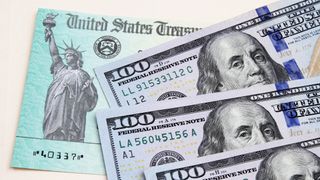$1,400 stimulus checks — here's who could be eligible for third stimulus check
Biden may have to lower income cap for payments

President Joe Biden's $1.9 trillion stimulus proposal — which includes sending $1,400 relief checks to most Americans — is still meeting resistance from Senate moderates, including some Democrats, leaving the specifics of who will qualify for future direct payments (and when) up in the air.
The original White House plan would provide $1,400 stimulus checks to the same low- and middle-income Americans who received up to $600 each from the relief package passed late last year. But due to bipartisan pushback on the total cost of the bill, the administration may consider limiting payment eligibility.
- Third stimulus check: Latest status, amount and calculator
- $1,400 stimulus check could get fast-tracked — here's how
- Plus: Third stimulus check: How much would the GOP proposal give you?
"Certainly, if there are ways to make that provision, and other provisions, more effective, that's something that we're open to, that we'll have conversations about," National Economic Council Director Brian Deese said on Tuesday (Jan. 26).
Biden himself on Monday (Jan. 25) said he would be "open to negotiate those things" if there was a chance of gaining broader support.
Will I get a third stimulus check?
One possibility is that the government will lower the eligibility ceiling for stimulus checks. Some individuals and families who received relief funds under the CARES Act last March, and then again in recent weeks, may not qualify for more money.
The $900 billion bill passed in Congress in December provided $600 stimulus checks to those earning up to $75,000, with prorated amounts going to anyone making up to $87,000. (Couples filing jointly received $150,000 and $174,000, respectively.)
Recent data from the Opportunity Insights Economic Tracker, a nonprofit research group, shows that households earning more than $78,000 are saving their stimulus money rather than spending it. This suggests that lower-income families need the funds to pay their bills while those making more do not.
Sign up to get the BEST of Tom’s Guide direct to your inbox.
Upgrade your life with a daily dose of the biggest tech news, lifestyle hacks and our curated analysis. Be the first to know about cutting-edge gadgets and the hottest deals.
The analysis also found that it would cost $200 billion to send another round of checks to individuals earning more than $50,000 and to couples bringing in more than $75,000, but that those check recipients would spend just 7% of that amount, or $15 billion.
While there are no formal proposals to limit stimulus-check eligibility, doing so may be one option for cutting costs. If your individual income was more than $50,000 the last time you filed taxes, it's possible you might not qualify for the next round.
A chance for monthly payments
Meanwhile, some progressive lawmakers want the Biden administration to consider distributing stimulus payments broken out into monthly checks rather than as a single lump sum.
Fifty-three House Democrats, including Reps. Ilhan Omar (D-Minnesota) and Alexandria Ocasio-Cortez (D-New York), sent a letter to the White House this week in support of recurring payments. The letter did not specify an amount, but some of the same lawmakers have previously called for a new round of $2,000 stimulus checks.
Again, the eligibility requirements are not defined. However, the group did suggest that "all immigrant workers, refugees and their families" be included. Individuals who are not legally authorized to work in the U.S. have not been eligible for previous stimulus checks.
Emily Long is a Utah-based freelance writer who covers consumer technology, privacy and personal finance for Tom's Guide. She has been reporting and writing for nearly 10 years, and her work has appeared in Wirecutter, Lifehacker, NBC BETTER and CN Traveler, among others. When she's not working, you can find her trail running, teaching and practicing yoga, or studying for grad school — all fueled by coffee, obviously.

